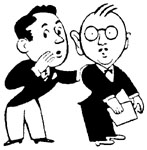
The Sin in Masturbation
GUEST COLUMN
It may seem petty, in this age of militant homosexuality and AIDS, of teenage promiscuity and abortion, of outspoken perversity so great that even pederasts lobby for recognition, to speak of the sin in masturbation. Indeed, it seems that most people have forgotten — if indeed they ever knew — that there is anything sinful in it at all. Perhaps not many would publicly extol masturbation, as our former Surgeon General did, to her political cost. But I would venture to guess that most would consider it a harmless peccadillo not to be spoken of in polite company, but not to be particularly condemned either. Such, in fact, was my own opinion until quite recently.
I was raised in a very liberal Protestant family in which masturbation, and sex generally, were simply not discussed. When, in my early adolescence, my parents detected in me a growing interest in sex, they handed my a book, and invited me to ask any questions I might have after reading it. This book, though tame by modern sex education standards, was fairly characteristic of the breed: Sexual intercourse was discussed wholly in terms of biology and reproductive “plumbing.” Pretty dry stuff — though explicit enough to be erotic to a 14-year-old.
But not a word did it say about masturbation — nor did my parents, my Sunday school teachers (United Church of Christ), or any other responsible adult. No one threatened me with acne, hair on my palms, imbecility, or an inevitable descent into horrible immorality. Nor did anyone inform me about the very real dangers — as opposed to the fabricated bogeymen that adults have used to scare children — that attend masturbation.
Small wonder, then, that I soon fell into the habit. True, the voice of conscience was not silent. Though no one ever told me that masturbation was wrong (and when I got to college, textbooks told me it was right), I nevertheless felt that it was somehow shameful, somehow beneath my dignity. Yet with nothing substantial to oppose it, I found the temptation overwhelming, and succumbed. And over the years what weak resistance I had initially offered all but vanished.
You May Also Enjoy
The fighting American revolutionary spirit has even informed the outlaws whose mission has been to kill members of the U.S. government, especially our presidents.
Reviews of For Whom There Is No Room: Scenes from the Refugee World... Risen Indeed: Making Sense of the Resurrection
Reviews of The Soul of a Lion: Dietrich von Hildebrand — A Biography... Two Chapels: Newman and the Case for Modern Martyrdom... The Catholic University as Promise and Project: Reflections in a Jesuit Idiom

